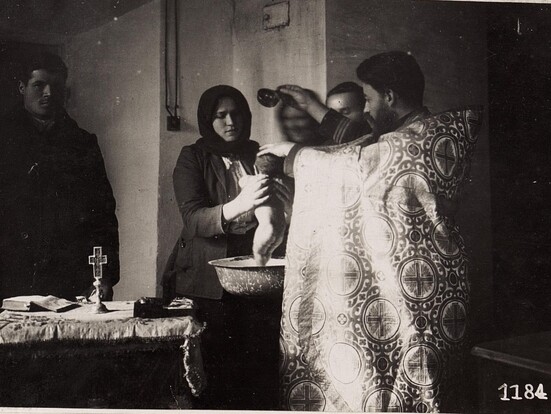
Who are the people we find in the column titled “Patrini” when we research birth records? How are they related to the family we are researching? How were they chosen to be godparents? What else can we learn about them? I have tried to answer these and some other questions below.
1. The godparents were called “куми” – /kumy/ in Ukrainian. The word «кум» originates from Latin “cum” – “in alliance”. “Kum” becomes a member of the family, the closest person to the parents of the child. This relation often was, and still, is considered even more important than a blood relation.
2. The godfather had to be at least fifteen years old and the godmother at least thirteen. In many cases, the priests advised the parents to choose married people. However, the church forbade the marriage of the godmother to the godfather of the same child, the same way that the marriage of blood relations was forbidden.
3. The godparents were chosen among the most respected people: relatives, good acquaintances, and friends. It was believed that their traits would be inherited by the child. Poor people tried to find rich people, to get a good gift and to secure the future of their child. These “chosen” godparents were not changed with future children but were invited to become the godparents of all the other children in the family.
4. If the godchildren were sickly or died early, it was explained as the wrong selection of godparents. In this case, the “chosen” godparents were substituted by strangers, who were met by chance and were considered to be the emissaries of God.
5. The godparents of the sickly child could also be substituted by the so-called “handout” godparents in a special rite. The child was handed out to the new “handout” godparents through the door (read more about the beliefs connected with the threshold in another post) or the window. Once the child was given to them, the “handout” godparents paid money to the parents of the child, put on a new shirt, and went to the church for another baptism ceremony. The child was to be handed back to the parents in the same way: through the threshold or the window.
6. Adultery between the parent and the godparent was a deadly sin. Some Hutsuls, (one of the ethnic groups of Ukrainian highlanders, check other posts to learn more) invited the men who they suspected of extramarital sex with their wives to be the godfathers, hoping that it would restrain lovers for the future.
7. In the mountainous regions of the Subcarpathian, Carpathian and Trans-carpathian regions, especially among the Hutsuls, there was a belief that the status of the godfather of an illegitimate child promotes good livestock management and a rich crop. It meant that children from extramarital relationships, who most often needed care, often had wealthy godparents, and public opinion exerted them to be strong supporters of these godchildren.
8. The number of godparents was different at different times and in different areas of Ukraine – from one to six couples of godparents or even more. It was the catholic influence to choose numerous godparents. The more the better, of course, since it meant that the child would get more support, especially since the death rate was quite high.
9. In the north of the Lemko area, the godmother was not allowed to raise her skirt when walking through the muddy section of the road, on the way back home from the church after baptism. If that happened, it was believed that the godchild would become dissolute when he/she grew up.
10. It was not recommended that an unmarried girl become the godmother of the first child in the family in Voroniaky village of Zolochiv district. They believed that, in this case, her private life would not go well and she would marry late.
11. In some villages of Ternopil province, the godmother took a piece of sweet bread to keep within her shirt during the baptism ceremony in the church. She treated each guest with a piece of this bread when they returned home saying “May this child be as sweet to you as this bread and sugar”.
12. It was considered a sin to reject the offer to be godparents. This was true as well for the bread, which was presented to the future godparents by the father of the child when he came to express his offer and invite them to the baptism.
Dear friends, I invite you to use this link if you like to sign up for my post updates and not miss our further publications. Also, feel free to contact us if you need help discovering your family story.